
Guests
- Jonathan Steelejournalist at The Guardian, where he once served as the organization’s Moscow correspondent. He is the author of Eternal Russia: Yeltsin, Gorbachev, and the Mirage of Democracy.
The United States and NATO are openly accusing Russia of sending combat forces into Ukraine as tensions continue to mount. According to the United Nations, nearly 2,600 people have been killed in eastern Ukraine since April in fighting between Ukrainian forces and separatist rebels sympathetic to Russia. On Thursday, at least 15 civilians were killed when Ukrainian forces shelled the rebel-held city of Donetsk. Meanwhile, a new Human Rights Watch report accuses the rebels of arbitrarily detaining civilians and subjecting them to torture, degrading treatment and forced labor. On Thursday, NATO released satellite images that it says show Russian artillery, vehicles and troops in and around eastern Ukraine. We are joined from London by The Guardian’s Jonathan Steele, the organization’s former Moscow correspondent and author of many books, including “Eternal Russia: Yeltsin, Gorbachev, and the Mirage of Democracy.”
Transcript
JUAN GONZÁLEZ: The United States and NATO are openly accusing Russia of sending combat forces into Ukraine as tensions continue to mount between the two countries following the coup in February that toppled Ukraine’s elected government. According to the United Nations, nearly 2,600 people have been killed in eastern Ukraine since April and fighting between Ukrainian forces and separatist rebels sympathetic to Russia. That figure doesn’t include the 298 victims of the Malaysian Airlines plane crash.
AMY GOODMAN: On Thursday, at least 15 civilians were killed when Ukrainian forces shelled the rebel-held city of Donetsk. Meanwhile, a new Human Rights Watch report accuses the rebels of arbitrarily detaining civilians and subjecting them to torture, degrading treatment and forced labor. On Thursday, President Obama addressed the crisis after NATO released satellite images they say show Russian artillery, vehicles and troops in and around eastern Ukraine.
PRESIDENT BARACK OBAMA: I just spoke with Chancellor Merkel of Germany on the situation in Ukraine. We agree, if there was ever any doubt, that Russia is responsible for the violence in eastern Ukraine. The violence is encouraged by Russia. The separatists are trained by Russia. They are armed by Russia. They are funded by Russia. Russia has deliberately and repeatedly violated the sovereignty and territorial integrity of Ukraine. And the new images of Russian forces inside Ukraine make that plain for the world to see.
JUAN GONZÁLEZ: President Obama also announced Ukrainian President Petro Poroshenko would visit the United States next month. Poroshenko was elected in May to replace Viktor Yanukovych, who was ousted in the February coup. Ambassadors from the 28 NATO countries and Ukraine are holding an emergency meeting today. At the United Nations, Russian Ambassador Vitaly Churkin accused the Ukrainian government of waging war against its own people by attacking cities in eastern Ukraine.
VITALY CHURKIN: [translated] The current escalation in the southeast of Ukraine is a direct consequence of the reckless policy of Kiev, which is directing war against its own people. With the support and under the influence of a number of states, the Kiev authorities have torpedoed all political agreements on resolving the crisis in the Ukraine.
AMY GOODMAN: To talk about the crisis, we go to London, where we’re joined by Jonathan Steele, the former Moscow correspondent for The Guardian. He’s the author of many books, including Eternal Russia: Yeltsin, Gorbachev, and the Mirage of Democracy.
Jonathan Steele, welcome back to Democracy Now! What do you think it’s most important to understand about the crisis in Ukraine right now?
JONATHAN STEELE: I think it is that Russia is trying to prevent Ukraine joining NATO, which is of course what some people in the West, particularly in the Baltic countries and Poland and the sort of neocons in Washington, would like it to do. I think the situation could be dramatically escalated if President Obama, now and at the big NATO summit that’s going to be held in Britain next week, would say that the U.S. respects the current strategic position of Ukraine, which is non-alignment, and would also say that there is no prospect of Ukraine joining NATO for the next at least 10 or 20 years. I think that would dramatically escalate the crisis. Putin would be immediately impressed and would be willing to make the concessions that are necessary.
JUAN GONZÁLEZ: And, Jonathan Steele, what do you make of the fact that it’s only been a couple of days since the Ukrainian president and Putin had a meeting that seemed to be—show promises of de-escalating the entire crisis?
JONATHAN STEELE: Well, I think it shows that they didn’t actually show promises of de-escalating the crisis. I presume that Putin was very disappointed with Poroshenko’s line in the private meetings, and he’s decided that he has to, you know, escalate the situation. You mentioned what Obama had said about Chancellor Merkel in his speech just a few hours ago. What he didn’t mention was that Merkel has said publicly, just in the last few days, that there has to be a ceasefire, there has to be a political, not a military, solution, and that Russia’s interests cannot be ignored. I mean, this is very sensible stuff from Chancellor Merkel. Unfortunately, it has not been echoed—publicly, at least—by President Obama and other NATO leaders. So that’s what I say is really important, is to push for a ceasefire, which the Russians have constantly called for, and get political negotiations which would guarantee the non-alignment in the future of Ukraine.
AMY GOODMAN: Speaking to reporters Thursday, President Obama said the U.S. will collaborate with its NATO allies in dealing with the Ukraine crisis, but he ruled out military action against Russia. This is what he said.
PRESIDENT BARACK OBAMA: We will continue to stand firm with our allies and partners that what is happening is wrong, that there is a solution that allows Ukraine and Russia to live peacefully. But it is not in the cards for us to see a military confrontation between Russia and the United States in this region. Keep in mind, however, that I’m about to go to a NATO conference. Ukraine is not a member of NATO, but a number of those states that are close by are. And we take our Article 5 commitments to defend each other very seriously.
AMY GOODMAN: I was wondering, Jonathan Steele, if you could respond to that? And also, in the U.S. media, you rarely hear Russia’s side. What are Russia’s interests?
JONATHAN STEELE: Well, I think it was interesting what he said about NATO. But again, he missed the crucial point, which was that he should have said that he respects the non-alignment of Ukraine and sees no value in it joining NATO. I mean, imagine what would happen if Canada or Mexico decided to join an anti-U.S. alliance? Obviously, the U.S. would be concerned. Russia has legitimate concerns about the expansion of NATO. But we’ve already heard, just in the other day, the secretary-general of NATO; Anders Fogh Rasmussen was saying that NATO is now going to pre-position stocks in eastern Europe and bring equipment in and have bases there. It’s only provocation, further provocation to Moscow. There is a battle going on, clearly, within NATO between hawks and doves, and Obama is sitting on the fence. He should come down on the side of the doves and make his position clear, which is similar, I think, to what Merkel has done. But even she has not dared yet publicly to come out and say she does not want Ukraine to join NATO.
JUAN GONZÁLEZ: And, Jonathan Steele, what do you make of the media coverage in the West, or the lack of media coverage, over the carnage and the civilian casualties in eastern Ukraine as a result of the Ukrainian forces advancing?
JONATHAN STEELE: Well, I mean, I’m very glad that in your report, at least, you put in the point that the U.N. has come out saying that 2,600 people, civilians, have been killed. That’s more than have been killed in Gaza in the recent month-long Israeli offensive. It’s a huge humanitarian disaster and crisis going on there. It’s hardly ever mentioned in the Western media. These are U.N. figures. And as you also pointed out correctly, the U.N. says the majority of those casualties are caused by the Ukrainian army against civilians, because they are trying to capture huge cities—Donetsk, Luhansk—where there are hundreds of thousands of people. Many have fled, but there are still hundreds of thousands remaining.
Now, Russia tried to highlight that whole issue two or three weeks ago when it sent this humanitarian convoy from Russia into Ukraine. And what happened? The Ukrainians immediately said, “This is the pretext for an invasion. This is an invasion.” The Russians then allowed people to look into those convoys. The OSCE looked into it. Ukrainian border guards looked into it. Western journalists looked into it. There was absolutely no sign of any military potential at all. It was simply humanitarian supplies. And eventually, it was allowed in—well, it wasn’t allowed in, the Russians drove it in because the Ukrainians refused to give the paperwork that was necessary, even though it was in no way military.
So, Russia was trying to highlight the civilian casualties, which is also why they keep pushing for a ceasefire. And unfortunately, the Ukrainian authorities insist on winning a military victory. First they thought they could do it by earlier this week, which was their Independence Day. They had said they were going to, quote, “liberate,” unquote, Donetsk before Independence Day, but that hasn’t happened. And they should now recognize they are not going to win a military victory. And Russia’s latest actions show that they’re going to make sure that the forces there, the rebel forces, are not defeated.
AMY GOODMAN: On Thursday, the U.S. and Russia had a heated exchange in the United Nations over the situation in Ukraine. U.S. Ambassador Samantha Power accused Russia of duplicity.
SAMANTHA POWER: Instead of listening, instead of heeding the demands of the international community and the rules of the international order, at every step Russia has come before this council to say everything except the truth. It has manipulated. It has obfuscated. It has outright lied. So we have learned to measure Russia by its actions and not by its words. In the last 48 hours, Russia’s actions have spoken volumes.
AMY GOODMAN: Samantha Power’s Russian counterpart, Vitaly Churkin, blamed Ukraine for escalating the situation by not honoring political agreements. He also advised the White House to stop meddling in world affairs.
VITALY CHURKIN: [translated] Now the American ambassador said, what kind of message can we send to Russia’s neighbors? Well, I would suggest that we send a message to Washington: Stop interfering with the internal affairs of sovereign states. Stop trying to undermine a regime that you don’t like. Restrain your geopolitical ambition. Then, not only Russia’s neighbors, but many other countries around the world would breathe a sigh of relief.
AMY GOODMAN: So that is the Russian ambassador to the U.N., Vitaly Churkin, and before that, Samantha Power. Jonathan Steele, if you could respond to what they said and also talk about, you know, the NATO satellite imagery showing Russian troops in Ukraine and also the Russian troops who were allegedly captured by Ukraine and Putin saying that they were just on holiday in Ukraine?
JONATHAN STEELE: Well, I think every big power uses this strategy of so-called plausible deniability. And that’s what Russia has been doing up to now. I mean, I think Samantha Power has some legitimacy in saying that the Russians are obfuscating and even telling lies. It would be much better if Russia came out clearly and said, “We have to defend these people because they are under attack. They have legitimate interests, but they have been under attack by their own government in Ukraine, and we have come to their defense. We’re not seeking to take over the whole of Ukraine. We’re not seeking to separate western—eastern Ukraine from Ukraine and join it onto Russia.” That would be a more honest way of handling it. But that is the Russian position. When the eastern Ukrainian leadership had this referendum two or three months ago about joining Russia, Putin said they should not hold the referendum. When the referendum nevertheless took place against his statements, they didn’t recognize the results of the referendum. So there’s no evidence that Russia is seeking to, as it were, re-create the Soviet Union or the 19th century Russian Empire and seize this part of Ukraine. It’s simply trying to defend people who have legitimate interests, who are worried about Kiev’s very anti-Russian, very—including anti-Russian language—strategy, and seek to defend them. So I think it would be better if Russia was more honest.
On the question of the prisoners, that may well be true that those people strayed into Ukraine inadvertently. There have been Ukrainian troops in the Russian side, and the Russians have returned them without making a big propaganda fuss about it when they’ve lost their way.
On the question of the satellite pictures which you asked about, I’m no expert on that. They look potentially convincing, but you’d have to get more independent expert opinion on that. We know how, you know, in the run-up to the invasion, Colin Powell was on the Security Council with all kinds of photographs and things which turned out to be fake. So, one has to be cautious on this, but they may well be true.
JUAN GONZÁLEZ: And, Jonathan Steele, what do you make of the calls for increasing economic sanctions, especially by the European Union, against Russia and the possibility that that might be effective in forcing some kind of a diplomatic settlement to this crisis?
JONATHAN STEELE: Well, it hasn’t been effective so far. So I don’t think there’s any reason to expect that more sanctions will be any more effective. I mean, Russian policy has not changed, it hasn’t softened. So, sanctions are not working. And there’s doubt, great doubt in Europe about the counterproductive element of it, of shooting oneself in the foot, because eurozone economies now are predicted not to grow this year. They’ve had to downgrade their forecasts. It won’t necessarily be negative growth, a collapse in output, but they could be just a flat-line position, no growth. And there are many concerns, particularly in Germany, over that. And, of course, Russia has retaliated by banning all food imports from the EU into Russia for at least the next year. And that is having an effect on European agricultural producers. So, it’s a very dangerous tit-for-tat thing, which both sides can suffer. But I don’t think it’s having any political effect, and therefore shouldn’t be relied on.


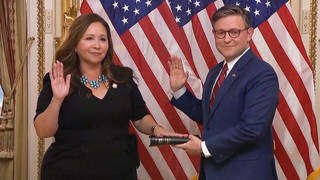
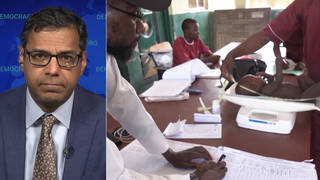
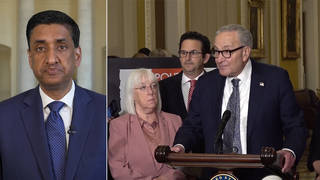





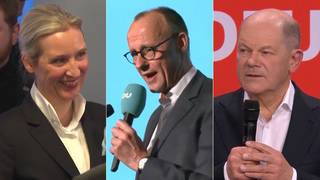
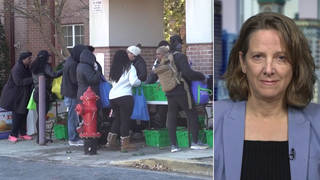
Media Options